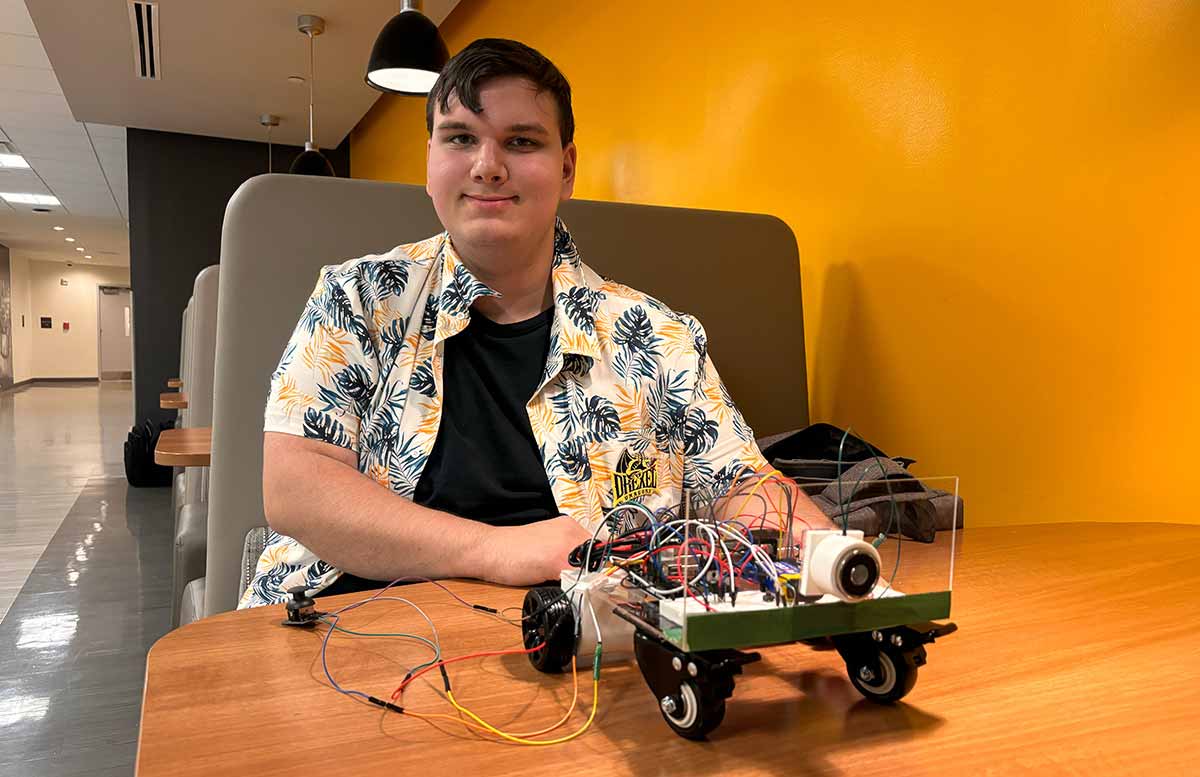
Two things have always fascinated Ben Hogan: the process of how things are
made, and outer space. While considering his options for college, aerospace
engineering seemed like the best of both worlds - until one of Hogan's
teachers advised him to go into mechanical engineering, which would allow
him to work in aerospace while also giving him more options.
"I came to Drexel to try out different professions," Hogan explained. "I
thought having the opportunity to work in different sectors, like
government and research, would give me a better idea of what I want to do
after college."
Hogan got the chance to try out research through the Students Tackling
Advanced Research (STAR) Scholars program, which allows highly motivated
students to work on faculty-mentored research, scholarly, or creative
projects during the summer after their freshman year.
Under the direction of Ajmal Yousuff, PhD, associate professor of
mechanical engineering and mechanics, has dedicated his summer to building
a robot for potential on-site asteroid surveillance.
While near-Earth asteroids are currently being monitored to detect future
impact with the planet, the robot Hogan is working on could be sent
directly to an asteroid via rocket for more detailed data collection. The
robot’s design is modular, consisting of many smaller robots that could
split up to cover more ground and connect back together via electromagnets.
Through advanced communication systems, the robot could then relay
important information to researchers on Earth, such as the asteroid’s
velocity and material composition.
Composition is a particularly interesting use for the robots, Hogan shared.
While asteroids pose a real threat to life on Earth, scientists have found
that they often contain high levels of materials like iron, platinum, and
gold. Sourcing these valuable metals from asteroids could allow mining
operations to move to space, mitigating the environmental impacts of mining
on Earth.
Sending objects into space is very expensive, however, so in addition to
learning the logistics of making robots, Hogan has found himself navigating
cost considerations, such as the size and weight of the robot (the smaller
and lighter it is, the less it costs to make and send to space) and
retrievability (since data from the robot would be sent to a singular home
base, additional modules could be sent to the asteroid and connect to the
existent modules for further data collection, as opposed to sending
entirely new robots).
The STAR program has also given Hogan a chance to explore technologies new
to him, such as Breadboard, Arduino, and electromagnets, while
simultaneously applying them to the robot, putting his time management
skills to the test. Hogan expressed the importance of being adaptable as a
STAR Scholar: during an early week of the term, his plans to test his
electromagnets before creating a prototype of the robot were uprooted upon
realizing that he was missing a few parts. He was forced to change his
plans for the rest of the term; he shifted his attention for that week on
doing research into materials for the prototype.
"Through this project, I've learned a lot about how to manage [the making
of objects being sent to space]," Hogan stated. "I feel like that knowledge
is going to be very helpful as someone who wants to go into aerospace in
the future."
Hogan has found fulfillment in his project in part thanks to Yousuff's
balanced approach as a mentor. "He gives me new ideas and assists me when I
ask, but also lets me work on my own and figure things out by myself, which
I find really freeing," Hogan said.
Additionally, Hogan never had much time to do his own research on space and
asteroids prior to STAR, so dedicating himself to such work through STAR
provided the opportunity he needed to explore his interests on a deeper
level. "This experience has bolstered my knowledge of space, which has been
really nice," Hogan commented. "Being able to conduct research about space
in a job-like setting really enforced that it's something I'm interested in
as a career."